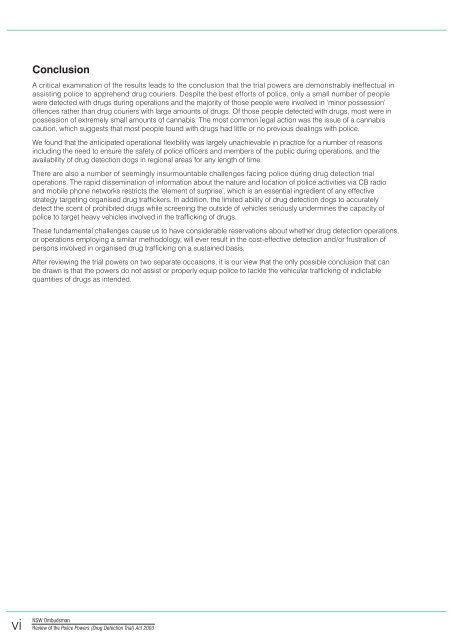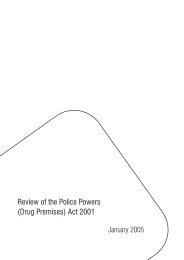Review of the Police Powers (Drug Detection Trial) Act 2003 - NSW ...
Review of the Police Powers (Drug Detection Trial) Act 2003 - NSW ...
Review of the Police Powers (Drug Detection Trial) Act 2003 - NSW ...
You also want an ePaper? Increase the reach of your titles
YUMPU automatically turns print PDFs into web optimized ePapers that Google loves.
Conclusion<br />
A critical examination <strong>of</strong> <strong>the</strong> results leads to <strong>the</strong> conclusion that <strong>the</strong> trial powers are demonstrably ineffectual in<br />
assisting police to apprehend drug couriers. Despite <strong>the</strong> best efforts <strong>of</strong> police, only a small number <strong>of</strong> people<br />
were detected with drugs during operations and <strong>the</strong> majority <strong>of</strong> those people were involved in ‘minor possession’<br />
<strong>of</strong>fences ra<strong>the</strong>r than drug couriers with large amounts <strong>of</strong> drugs. Of those people detected with drugs, most were in<br />
possession <strong>of</strong> extremely small amounts <strong>of</strong> cannabis. The most common legal action was <strong>the</strong> issue <strong>of</strong> a cannabis<br />
caution, which suggests that most people found with drugs had little or no previous dealings with police.<br />
We found that <strong>the</strong> anticipated operational flexibility was largely unachievable in practice for a number <strong>of</strong> reasons<br />
including <strong>the</strong> need to ensure <strong>the</strong> safety <strong>of</strong> police <strong>of</strong>ficers and members <strong>of</strong> <strong>the</strong> public during operations, and <strong>the</strong><br />
availability <strong>of</strong> drug detection dogs in regional areas for any length <strong>of</strong> time.<br />
There are also a number <strong>of</strong> seemingly insurmountable challenges facing police during drug detection trial<br />
operations. The rapid dissemination <strong>of</strong> information about <strong>the</strong> nature and location <strong>of</strong> police activities via CB radio<br />
and mobile phone networks restricts <strong>the</strong> ‘element <strong>of</strong> surprise’, which is an essential ingredient <strong>of</strong> any effective<br />
strategy targeting organised drug traffickers. In addition, <strong>the</strong> limited ability <strong>of</strong> drug detection dogs to accurately<br />
detect <strong>the</strong> scent <strong>of</strong> prohibited drugs while screening <strong>the</strong> outside <strong>of</strong> vehicles seriously undermines <strong>the</strong> capacity <strong>of</strong><br />
police to target heavy vehicles involved in <strong>the</strong> trafficking <strong>of</strong> drugs.<br />
These fundamental challenges cause us to have considerable reservations about whe<strong>the</strong>r drug detection operations,<br />
or operations employing a similar methodology, will ever result in <strong>the</strong> cost-effective detection and/or frustration <strong>of</strong><br />
persons involved in organised drug trafficking on a sustained basis.<br />
After reviewing <strong>the</strong> trial powers on two separate occasions, it is our view that <strong>the</strong> only possible conclusion that can<br />
be drawn is that <strong>the</strong> powers do not assist or properly equip police to tackle <strong>the</strong> vehicular trafficking <strong>of</strong> indictable<br />
quantities <strong>of</strong> drugs as intended.<br />
vi<br />
<strong>NSW</strong> Ombudsman<br />
<strong>Review</strong> <strong>of</strong> <strong>the</strong> <strong>Police</strong> <strong>Powers</strong> (<strong>Drug</strong> <strong>Detection</strong> <strong>Trial</strong>) <strong>Act</strong> <strong>2003</strong>

















